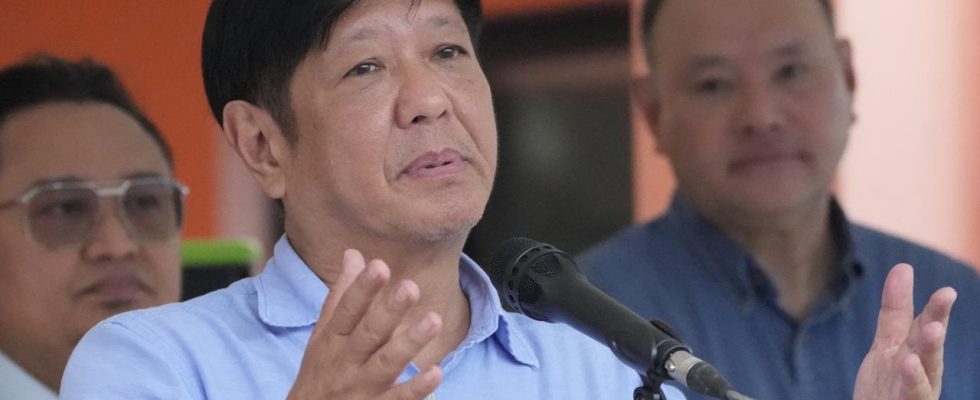Thousands of people have been killed in the Philippines during President Duterte’s self-declared war on drugs. His successor has been in office for a year. Has anything changed in the “anti-drug war” since then?
With roaring engines they race through the streets of Manila, the tricycle drivers, always looking for a passenger who wants to be maneuvered through the traffic jam for a few pesos. Jenny’s brother, she doesn’t want to give her real name, is one of them. Until autumn 2017.
Plainclothes police officers bang on her door, and shots are fired shortly afterwards. Her 25-year-old brother and an uncle are dead. Both would have used crystal meth but wanted to stop, says Jenny. That’s why they let themselves be put on a government list. “But this list was only used to track people down.”
climate of fear and terror
In the six years in office of ex-President Rodrigo Duterte until 2022, thousands of people died in his self-declared war on drugs. He sent killer squads, police officers became murderers. Duterte created a climate of fear and terror in the Philippines.
Jenny’s brother is one of the victims of the Duterte administration. To this day, her children are traumatized, she continues: “Every time, when they see someone in uniform, they think someone’s about to get killed again. Because they remember what happened to my brother and my uncle.”
Traces should be erased
They and hundreds of other families found solace in Catholic minister Flavie Villanueva. He has the bodies of victims exhumed and handed them over to the only independent medical examiner in the country. This is always possible when the grave lease expires after five years and people lack the money for an extension.
False death certificates often come to light through autopsies. “We have a saying in Tagalog that means something like: Bones tell the truth. They show whether torture was used and whether there was an intention to kill.” Traces that should be erased are thus uncovered, says Villanueva.
After the autopsy, Villanueva has the bodies cremated and gives the urns to the relatives. They are now to be solemnly buried in a peace forest. Despite all the sadness, Jenny is happy that her brother will be lying in a beautiful place.
Is he “Anti-Drug War” further?
A new president has been in office for a year: the son of former dictator Marcos, Ferdinand “Bongbong” Marcos Jr.
Jenny finds that not much has changed in the first year under Marcos: the “anti-drug war” continues unabated. Villanueva sees it differently. The president did not officially criticize Duterte’s “war on drugs,” but ordered his people to stop killing.
However, from Carlos Conde’s point of view, this has not yet arrived everywhere. Conde specializes in the anti-drug campaign. He was an investigative journalist for 20 years and now works for the human rights organization Human Rights Watch (HRW).
14 murders in one week
He says the University of the Philippines, which counts violent crimes related to the “war on drugs,” identified 14 murders in the last week of May. There are still attacks against activists and journalists who deal with the “war on drugs” and its victims. “Three have just been killed again, so nothing has changed there,” he says.
According to monitoring, 322 people have been killed in the campaign against drugs since Marcos took office. This is significantly less than under Duterte, but Marcos is following the script of his predecessor. Duterte had put the number of dead during his tenure at around 6,200. However, human rights groups assume up to 30,000 dead.
Just four convicted cops
One should also not forget that more than half of the people involved in the murders are police officers and only four have been convicted so far, warns Conde. In the spring, the United Nations called on the Philippines to better investigate the crimes committed in the “war on drugs”.
The International Criminal Court (ICC) began investigating crimes against humanity in 2018. However, the Duterte administration withdrew from the court in 2018, and the new administration has so far refused to let investigators into the country.
In conversation with the ARD Foreign Minister Enrique Manalo defended this position. From his point of view, the ICC is important in countries without a functioning legal system, for example to prosecute massive human rights violations. But that is not necessary in the Philippines, since the judiciary works here.
So far no cooperation with The Hague
“Yes, the justice system works, but only for rich people who can afford a lawyer,” says Conde of HRW. But it doesn’t work for the poor, who are the victims of the “war on drugs”.
The activist considers it a tactic that the incumbent president and his government are not cooperating properly with the ICC. Because ex-president Duterte still has many supporters who are also behind the “anti-drug fight”. And they could be dangerous for Marcos Jr.
However, Conde can imagine that in the long term the government will also find a way to cooperate with the International Criminal Court – at the latest by the 2025 midterm elections.

